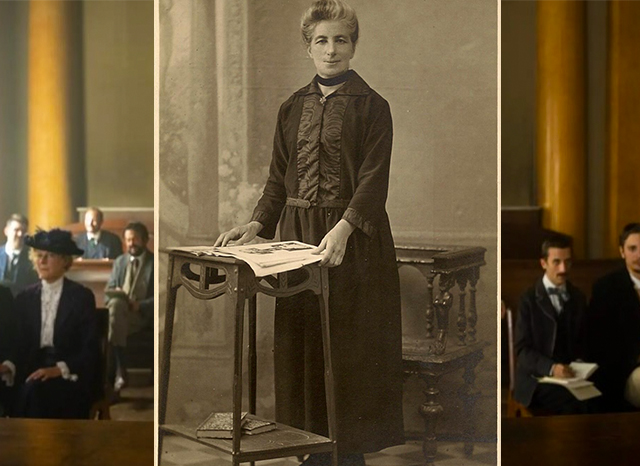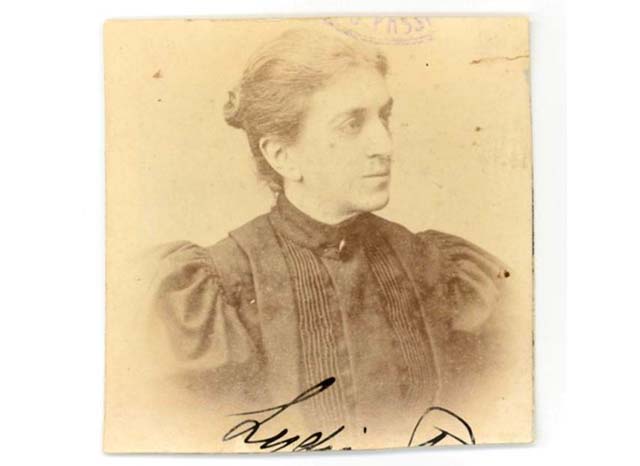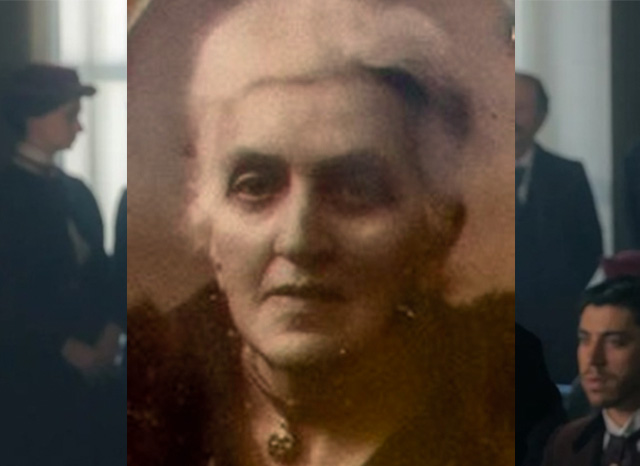
Celebriamo l’8 Marzo con una Pioniera del Diritto — Lidia Poët
Celebrating International Women’s Day with a Legal Trailblazer — Lidia Poët
Chi era Lidia Poët?
Who Was Lidia Poët?
Nata nel 1855 in una famiglia benestante della zona di Pinerolo, era la più giovane di quattro fratelli e tre sorelle. A tredici anni, bionda, bella e di talento, ha detto a suo padre che voleva andare a scuola come i suoi fratelli. Una volta che ha avuto la possibilità di studiare, voleva di più. Dopo la morte del padre, convinse la madre, ora vedova, a permetterle di studiare per la sua “Maturità al Liceo.” Laureata, si iscrive all’Università di Torino, Facoltà di Giurisprudenza.
Born in 1855 into a wealthy family in the Pinerolo area, she was the youngest of four brothers and three sisters. At thirteen, blond, beautiful, and talented, she told her father she wished to attend high school like her brothers. Once she had a taste of education, she wanted more. After her father’s death, she convinced her mother, now a widow, to allow her to study for her “maturità al liceo.” Once she obtained her degree, she enrolled in the University of Turin, Faculty of Law.

La Laurea e il Trionfo
Her Law Degree and Triumph
Il 17 giugno 1881, Poët ricevette la laurea in legge da quell’istituzione, scrivendo una tesi sullo status delle donne nella società e sul diritto di voto delle donne. Dopo la scuola di legge, si è formata in uno studio legale. Dopo aver superato l’esame pratico dell’Ordine degli Avvocati di Torino nel 1883, Lidia Poët viene iscritta all’albo e diviene la prima donna italiana ammessa all’esercizio della professione forense.
On June 17, 1881, Poët received her law degree from that institution, writing a thesis on women’s status in society and women’s right to vote. After law school, she trained in a legal studio. When she passed the practical examination of the Order of Advocates of Turin in 1883, Lidia Poët was inscribed in the roll of lawyers — l’albo degli avvocati — and became the first Italian woman admitted to the practice of law.
Curiosità sulla parole: Avvocata o Avvocatessa?
Fun Fact about the words: “Avvocata” or “Avvocatessa”?
La questione è ancora dibattuta, ma l’Accademia della Crusca ha stabilito che il termine corretto è “avvocata.” Sentitevi liberi di usare quello che preferite!
The matter is still debated, but the Accademia della Crusca has ruled that “avvocata” is correct. Feel free to use whichever term you prefer!

Una Vittoria Breve
A Short-Lived Victory
Il nuovo status di avvocato di Poët non passò inosservato e causò piuttosto un certo scalpore. Due avvocati, incensato che una donna era stata ammessa nella legge, in segno di protesta si dimise dal bar. Ma secondo il presidente Xavier Francesco Vegezzi e altri quattro consiglieri, “secondo le leggi civili italiane, le donne sono cittadini come gli uomini” e avevano tutto il diritto di praticare la legge.
Poët’s new status as a lawyer did not go unnoticed and rather caused quite a stir. Two lawyers, incensed that a woman had been admitted into the law profession, in protest resigned from the bar. But according to President Xavier Francesco Vegezzi and four other councilors, “under Italian civil laws, women are citizens like men” and had every right to practice law.
Tuttavia, la vittoria di Poët fu breve e dopo tre mesi fu radiato dall’albo. Gli uomini in posizioni di potere erano pronti e disposti a distruggere il successo di Lydia, quindi ancora una volta bloccando il movimento femminile.
However, Poët’s victory was short-lived, and after three months, she was disbarred. Men in positions of power were ready and eager to squash Lidia’s success, thus again setting back the women’s movement.
Utilizzando il suo intelletto e ragionamento equilibrato, e con il sostegno della maggior parte dei giornali italiani, ha fatto appello alla Corte Suprema di Cassazione, la più alta corte d’appello o “la corte di ultima istanza in Italia.” Tuttavia, il tribunale maschile lo respinse categoricamente e la decisione del tribunale inferiore fu confermata. Le fu detto che non poteva esercitare la professione legale, ma poteva mantenere il titolo di Miss Lidia Poët, una laureata in legge, e le fu detto che doveva ancora pagare “spese legali” per continuare ad avere questo titolo.
Using her intellect and level-headed reasoning, and with the support of most Italian newspapers, she appealed to the Supreme Court of Cassation, the highest court of appeal or “the court of last resort in Italy.” However, the male-dominated court flatly turned her down, and the lower court’s decision was confirmed and upheld. She was told she could not practice law but could retain the title Miss Lidia Poët, a law graduate, and was told she still had to pay “legal fees” to continue to have this title.
La Tenacia di Lidia
Lidia’s Tenacity
Devastata ma non sconfitta, Lidia si insinua con astuzia nello studio del fratello. Lì lavorò come avvocato, come aveva studiato e addestrato a fare. E anche se non poteva firmare lettere o supplicare in tribunale, è diventata una forza trainante dello studio. Quando suo fratello partiva per Vichy ogni anno, assumeva pienamente la pratica e, quando necessario, cercava colleghi maschi per appellarsi in tribunale a nome dei suoi clienti.
Devastated but not defeated, Lidia cleverly insinuated herself into her brother’s law office. There she worked as an advocate, as she had studied and trained to do. And even though she could not sign letters or plead in court, she became a driving force of the firm. When her brother departed for Vichy each year, she took over the practice entirely and, when necessary, sought out male colleagues to plead in court on behalf of her clients.
“Tutti i giorni lei era al suo posto di lavoro, elegante, sorridente, disponibile, piena di entusiasmo. I clienti la adoravano. Settimana dopo settimana, mese dopo mese, consultando codici e scrivendo con la bella penna d’oro, la signorina Poët esercitava di fatto l’avvocatura, ma dietro le quinte, senza un titolo, senza un riconoscimento ufficiale, «redigendo atti e pareri che non poteva firmare per cause che non poteva discutere.” [Iodonna.it]
”She was elegant, smiling, helpful, and enthusiastic at her workplace every day. Customers loved her. Week after week, month after month, consulting codes and writing with the beautiful golden pen, Miss Poët practiced law, but behind the scenes, without a title, without official recognition, “drafting acts and opinions that she could not sign for causes that she could not litigate in the courts.” [Iodonna.it]
Il Ritorno al Successo
A Return to Recognition
Trentasei anni dopo, nel 1920, a 65 anni, Lidia fu ufficialmente riconosciuta come avvocata.
Thirty-six years later, in 1920, at age 65, Lidia was officially reinstated as a lawyer.
Lidia dedicò la vita alle cause femminili, difendendo bambini, donne e i più deboli. Non si sposò mai, non ebbe figli, e morì nel 1949 a 94 anni.
Lidia devoted her life to feminist causes, defending children, women, and the marginalized. She never married, had no children, and passed away in 1949 at age 94.

Lidia Poët su Netflix
The Law According to Lidia Poët: Now on Netflix
Netflix ha lanciato una serie drammatica con Matilda De Angelis. Sebbene romanzata, la serie illumina il nome di Lidia Poët e le sue straordinarie conquiste, portandole a una nuova generazione.
Netflix has released a drama starring Matilda De Angelis. While fictionalized, the series shines a spotlight on Lidia Poët’s extraordinary achievements for a new generation.
Girata a Torino, la serie è un piacere per gli occhi: costumi sontuosi, cappelli eleganti e gioielli d’oro rubano la scena. Due pollici in su!
Filmed in Turin, the show is a feast for the eyes: sumptuous costumes, elegant hats, and golden jewelry steal the scene. Two thumbs up!
Lidia Poet New Netflix Italian Drama
Concludendo l’8 Marzo
Honoring Lidia on International Women’s Day
Discutendo di Lidia Poët, celebriamo il suo coraggio e riconosciamo il suo contributo ai diritti delle donne, un tema ancora attuale nel 2023.
By celebrating Lidia Poët, we honor her courage and recognize her contributions to women’s rights—an issue that remains relevant even in 2023.











